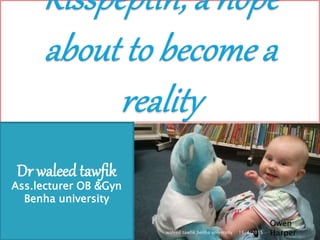Kisspeptin hope about to become reality
- 1. Owen Harper Dr waleed tawfik Ass.lecturer OB &Gyn Benha university 16/4/2015waleed tawfik,benha university
- 5. ’üĮ What is ’üĮ Does it stimulate reproductive Human release ’üĮ Is it helpful in IVF 16/4/2015waleed tawfik,benha university
- 7. ’āś Kisspeptins are a family of proteins that are essential for fertility. ’āś The first gene member of the family was discovered in 1996 (KISS 1) by a group working in Hershey, Pennsylvania. It is named after the cityŌĆÖs chocolate ŌĆśKissesŌĆÖ, which are made in Hershey. 16/4/2015waleed tawfik,benha university
- 10. ’üĮ Kisspeptin is produced from the hypothalamus and causes a chain reaction which leads to production of neurotransmitters from the pituitary gland. The neurotransmitter signals lead to the release of other hormones (luteinising hormone and follicle stimulating hormone) into the blood. These act on testes andovaries to produce the sex hormones testosterone and oestradiol, which cause the physical and emotional changes that are well recognised during puberty. Dhillo et al .,2005 16/4/2015waleed tawfik,benha university
- 11. ’üĮ LH FSH Estrogen / testesterone Kisspeptin/GPR54 hypothalmus Ant. pitutary gonads 16/4/2015waleed tawfik,benha university
- 13. HCG trigger FSH stimulation mature immature ovary Excessive stimulation OHSS 16/4/2015waleed tawfik,benha university
- 14. Pleural effusion Ascites Renal failure 16/4/2015waleed tawfik,benha university
- 15. ’üĮ Ovarian hyperstimulation syndrome (OHSS) is a major medical problem. ’üĮ It can be fatal in severe cases and it occurs in women undergoing IVF treatment who are otherwise very healthy. ’üĮ We really need more effective natural triggers for egg maturation during IVF treatment 16/4/2015waleed tawfik,benha university
- 16. GnRh hypothalamus kisspeptin GnRH agonist Ant pitutary ovary HCGLH receptor LH FSH 16/4/2015waleed tawfik,benha university
- 17. Kisspeptin is a novel physiological trigger for inducing oocyte maturation in IVF therapy 16/4/2015waleed tawfik,benha university
- 20. 53 patients 1.6/3.2 nmol/kg N=(5) 6.4nmol/kg N=(24) 12.8 nmol/kg N=(24) 16/4/2015waleed tawfik,benha university
- 27. ’üĮ We are in front of a new revolution in human reproduction understanding. ’üĮ Kisspeptin can be used as a novel physiological trigger for egg maturation in IVF therapy. ’üĮ Future studies will assess efficacy in women at high risk of OHSS. 16/4/2015waleed tawfik,benha university



























